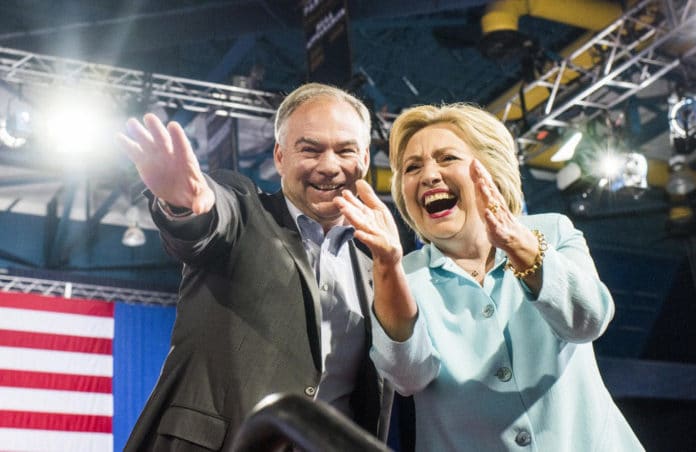MIAMI – The newly formed Democratic ticket took the stage together for the first time in Miami, showing off a partnership that prizes steadiness over flashiness.
As Hillary Clinton presented her vice-presidential choice, Virginia Sen. Timothy M. Kaine, to a roaring crowd of supporters, she noted that her choice stood in clear contrast to the Republican nominee Donald Trump and his running mate, Indiana Gov. Mike Pence.
“Senator Tim Kaine is everything Donald Trump and Mike Pence are not,” Clinton said. “He is qualified to step into this job and lead on Day One.
“And he is a progressive who likes to get things done!”
The two launched their partnership here at Florida International University, a campus that is two-thirds Hispanic. The diverse audience waved American flags and Puerto Rican flags as they waited — in some cases for hours — for Clinton and Kaine to take the stage.
After months of deliberation, Clinton announced on Friday night that she had chosen Kaine, passing over a number of other more diverse candidates for a self-described “boring” white man from Virginia.
But Kaine has long been a front-runner for the job. He was passed over by President Obama for the vice-presidential job in 2008, but in the intervening years he beefed up his resume, winning a Senate seat in a key swing state, serving on the Senate Foreign Relations Committee to accrue foreign policy experience, and establishing himself as a well-liked pragmatist.
All along, Clinton’s aides and allies said that her top priority was finding a partner who would not just help her govern, but who is also qualified and prepared to do the job from day one.
Kaine — a former governor, mayor, and Democratic National Committee chairman — outstripped other contenders with a background that satisfied that qualification.
Almost immediately, Trump began criticizing Clinton’s pick on Twitter, claiming that Kaine is “owned by the banks” and criticizing him for accepting gifts as governor of Virginia, a practice that was legal at the time in the state.
The appearance comes just days before Democrats will gather to host their party’s convention in Philadelphia. And it follows the Republican convention in Cleveland, which was characterized the public airing of controversies and intra-party divisions.
With Kaine on the ticket, Clinton is doubling down on her key argument against Trump: that she would be the steadier hand, prepared to take on the domestic and international challenges that the country faces.
“More than anything, what she’s selling is temperament and reliability versus concerns about Trump’s temperament and his impulsiveness,” said David Axelrod, a senior aide in Obama’s presidential campaigns. “Kaine is solid as a rock and will project a sense of stability.”
Clinton called Kaine at 7:32 p.m. on Friday night to offer him the job. Hours earlier, as Kaine traveled in New England for fundraisers, he told his audience that he “honestly” did not know whether he had been picked.
The deliberations were shrouded in secrecy for months, with only Clinton, family members and very close campaign aides having any idea of whom she would select.
According to a person familiar with the plans for Clinton’s events in Florida, the campaign did not tell staff on the ground who or even whether a vice-presidential pick would be announced at the events in Tampa on Friday or in Miami on Saturday. The events were planned to accommodate a number of possible running mates.
By the time the midday rally began, newly minted “Clinton-Kaine” signs were hanging from the rafters, and a slightly altered playlist included some country music tunes, perhaps in a nod to the running mate’s Virginia ties.
While Democrats caution that vice presidents rarely make or break an election, Kaine’s connections to Virginia, a key battleground state, is a bonus.
And facing a Republican opponent like Trump who has run a fundamentally unconventional race, the pick demonstrates that Clinton opted not to insert any unnecessary risk into the race.
Other candidates might have injected greater enthusiasm in the most liberal corners of the Democratic base, but Kaine’s pragmatism could also help Clinton attract support from middle-of-the-road suburban voters or Republicans who are unsure of whether they could support Trump.
Still, progressive groups balked at her pick of Kaine, who they said does not reflect the party’s leftward shift. For example, Kaine initially supported the Trans-Pacific Partnership, a trade deal opposed by labor groups and some in the Democratic party’s base.
On the campaign trail, Kaine’s Midwestern roots shine through. The Missouri native projects a folksiness that belies his Ivy League education which, given Clinton’s challenges with white male voters, could prove an asset.
But Kaine is also a surprisingly apt fit for launching Clinton’s vice-presidential pick in a state like Florida, a critical battleground with a large number of Hispanic voters. Kaine speaks Spanish fluently and spent a year working as a missionary in Honduras.
The skill will allow him to be a surrogate in Spanish language media. But by turning down several potential Latino running mates, Clinton and Democrats will need to look elsewhere for ways to drive up turnout from Hispanic voters, a key bloc of the Democratic base.






